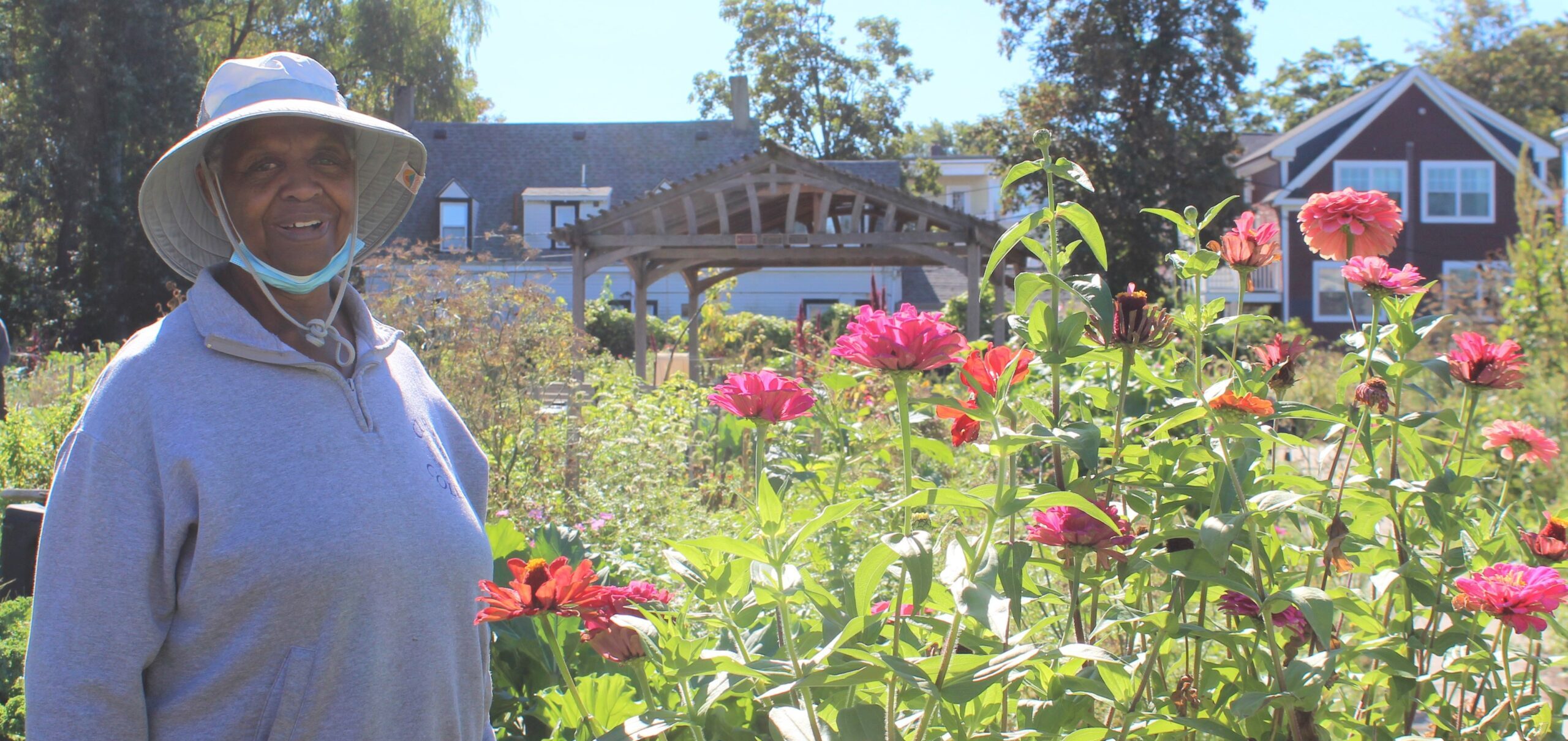Sowing Seeds and Growing Community
Founders Circle members support a vast array of properties and programs at The Trustees, including the 56 community gardens in Boston under our management. Overseeing 15 acres across eight neighborhoods, The Trustees is the largest nonprofit owner of community gardens in the city.
One of the oldest and largest of our Boston gardens is Nightingale Community Garden in Dorchester, which was founded in the 1970s by residents who reclaimed an empty lot and transformed it into a shared garden space. With your support, The Trustees helps maintain and supply these lush oases, as well as run outdoor events, workshops, and programs for members of the community.
The story of Nightingale Community Garden cannot be told without Dorchester resident Elnora Thompson—not only the garden coordinator, but the heart and soul of Nightingale for more than 35 years.
“I’m here all the time. I feel happy when I come here,” Elnora said, on a sunny fall afternoon at the garden. “When I have problems and I can’t work it out, I come here and stay here for an hour and pull up weeds.”
Elnora grew up in Mississippi and moved to Boston in 1967. She learned how to grow fruits and vegetables on her grandfather’s farm in Mississippi and from her mother, who “grew everything we ate,” according to Elnora.
“I grew up gardening from the time I was in diapers,” she said.
Elnora came to the Dorchester garden in the 1980s, when it was in a state of disrepair with limited arable soil and water access, but limitless possibilities. Knocking on neighbors’ doors and building local support, Elnora gathered a core group of 40 gardeners, almost all of whom still tend to their plots today.
After years of public and private support, and more than a decade of Trustees stewardship, Nightingale now has grown from a few dozen gardeners to 132 plots for people from the surrounding neighborhoods in Dorchester, Roxbury, West Roxbury, and Hyde Park. The city farmers plant just about everything that can grow in New England, from broccoli, Brussels sprouts, and callaloo to tomatoes, wildflowers, and zucchini. Each gardener grows food for themselves and their family and some donate their fresh produce to local food pantries. As coordinator, Elnora welcomes new members and helps acquire the seeds and compost for the garden.
Nightingale is more than just a plot of land to grow vegetables on. It’s a central green space that brings people together to grow the bonds of community.
“We have birthdays here for people in the neighborhood, we have church services out here, art programs, people bring their kids to ride their bikes here, all kinds of things,” Elnora said. “This is a true community garden.”
And the community that is fostered at Nightingale is reflective of the city at large.
“We have people from all over the world who garden here. Vietnam, China, Haiti, Cape Verde, Jamaica.” Elnora said. “Sometimes we have an international food festival and swap recipes and seeds.”
This sense of community was particularly helpful in the early days of the pandemic when the size of the garden allowed for safe outdoor socializing.
“We felt like we were alive again for the first time,” Elnora said. “It was good just to be out here, and still communicating with each other.”
In addition to diverse backgrounds, the people who come to the garden also span a wide age range, from toddlers to seniors. Spending time with kids in the garden teaching them about where their food comes from, whether they’re summer campers or a garden member’s family, is one of Elnora’s favorite activities.
“One woman brought her 8-year-old daughter here for her first experience in gardening this past summer and she absolutely loved it,” Elnora said. “I enjoy passing this on to younger kids.”
In her plot this past season, Elnora grew sweet potatoes (which she’s grown for the past decade), bird peppers (which she has grown since she was a little girl), and giant collard greens (from seeds that came from North Carolina), just to name a few. With more than 70 years of farming experience, what advice does Elnora have for the aspiring gardener?
“Not everything is gonna grow. If something dies, try something else,” she said. “One year you may have abundance of everything, the next year everything you have might die. Don’t give up.”
While the garden is dormant for the winter, Elnora looks forward to March 17, the unofficial opening day when everyone returns to the garden for the start of a new growing season.
“When everyone sees each other after a long winter, it’s a hug fest,” she said.
Read on to learn more about our special Founders Circle events coming up this spring and summer!
